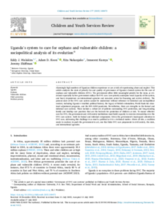Alarmingly high numbers of Ugandan children experience or are at risk of experiencing abuse and neglect. This article analyzes the state of priority for and quality of governance of Uganda’s formal system for the care of orphans and vulnerable children (OVC). The government offers little meaningful priority for the issue, as evidenced especially by low government outlays for OVC care. Low priority underpins weak capacity of the system, and heavy dependence on international agencies and non-state actors for financing and service delivery. The present state of the OVC care system cannot be understood without reference to historical and sociopolitical context, including Uganda’s troubled political history, the legacy of British colonialism, World Bank-led structural adjustment programs, and the HIV/AIDS pandemic. Nevertheless, there are strengths in the formal and informal care systems. These include a robust set of policies surrounding OVC protection, and long-standing family and kinship care practices that are the bedrock for protection of children at risk. To ensure effective care for OVC, the government and civil society institutions must build capacity to exercise stewardship over the OVC care system—both its formal and informal components. Given the government’s inadequate attention to OVC care, addressing this challenge is as much a political as it is a technical matter. Above all else, a coalition needs to coalesce to push the government to act, one that links OVC care proponents in civil society, the state, and international agencies.

